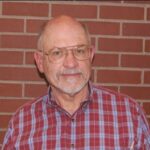by James Hearne
Horizon Reporter
 “When we really get down to it, remember it’s not just a few trees down there,” Wayne Erickson says to his Biology 241 class. “It’s a whole ecosystem.”
“When we really get down to it, remember it’s not just a few trees down there,” Wayne Erickson says to his Biology 241 class. “It’s a whole ecosystem.”
In this instance, he is talking about the complex workings of muscle tissue, while pointing to the illustration being projected on the screen, which resemble something akin to liquorice candy. But he could be talking about any given aspect of the subject matter. Erickson said he is interested in the study of life. “I’ve always had a total fascination with why we are the way we are,” he said.
Erickson has been teaching biology at Whatcom Community College for 15 years. Before that, he was a veterinarian.
After earning his bachelor’s in zoology, at Central Washington University, Erickson was drafted into the Army during the Vietnam War, where he served in the infantry. He then earned his master’s in biology at Washington State University and enrolled in WSU’s veterinary school. But his master’s had been in teaching biology, and he found that he enjoyed it so much that he decided to look into it later on down the road.
“I made a pact with myself that, when I turned 50, I would look at teaching,” he said. He wanted to stick close to home (his practice had been in Sumas). He liked the community college atmosphere. Whatcom seemed like a perfect fit.
Erickson implores his students to think visually about the subject matter. “You should have a picture in your mind of what happens when a muscle contracts,” he tells his students. Though he is quite serious about teaching, he can be up for a joke or two. He warns the class that an upcoming test is one of the most difficult.
A student raises her hand. “You said that about the last one,” she says.
“Oh, I can do better than that,” he said with a sly grin.
Erickson said that he continues to be astounded by how his field advances.
“There is so much more we know about the bio-chemistry of cells and how they work,” he said. Some of the most important leaps in knowledge, he says, came with the HIV/AIDS epidemic. He acknowledges that it sounds terrible, but studying the virus has led to enormous leaps forward in the field of virology, the study of viruses and how they work, as well as immunology, the study of the immune system.
He lists some of the biologists who inspire him the most: Jane Goodall, the primatologist who studied the behavior of apes, and Rosalind Franklin, who used x-rays to determine what DNA molecules look like.
As a veterinarian, his practice mainly focused on treating farm animals, and he says that he misses caring for them. “I also miss diagnosing and treating diseases on critters who can’t talk,” he said.
Overall, Erickson said that while he misses being a vet at times, he is perfectly happy where he is now.
“I am very happy teaching,” he says. “I’ll probably retire as a teacher.”
